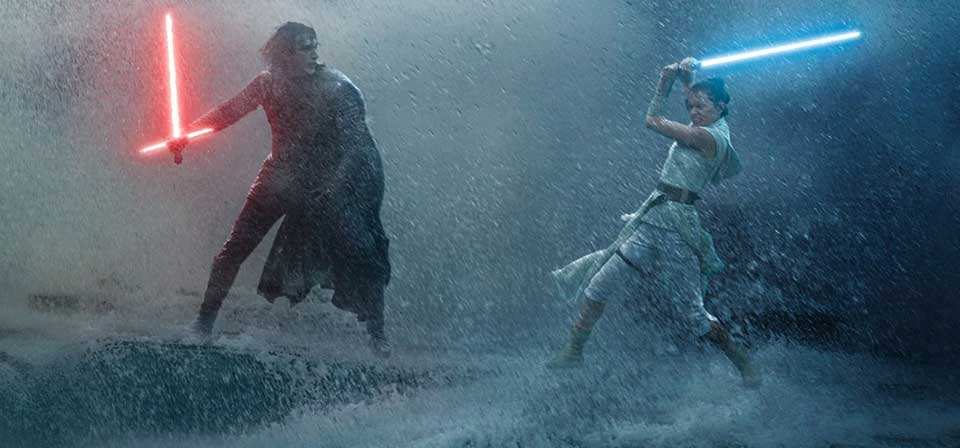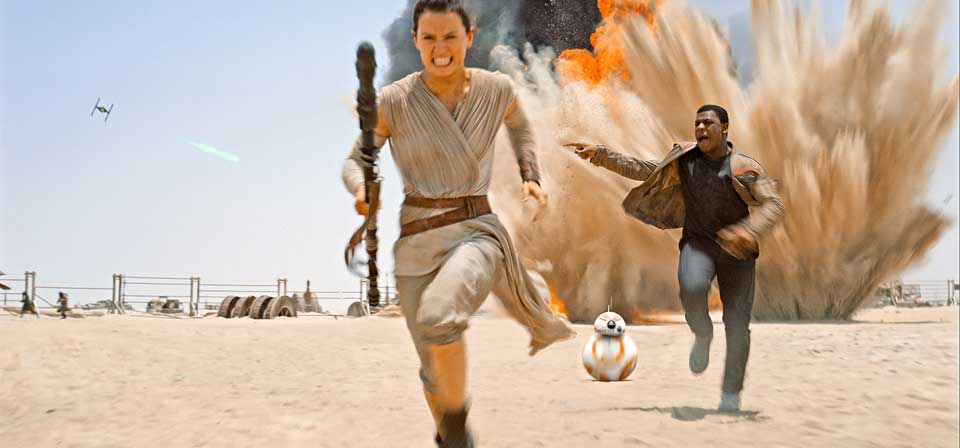Star Wars: Episode VIII: The Last Jedi (2017)
Star Wars: Episode VIII — The Last Jedi is a strange beast: a swashbuckling action movie that is deeply skeptical of derring-do; a middle movie that works better as riff and commentary on the original source material than as a sequel to its immediate predecessor.
The Star Wars films have always been two things, not always successfully. On the one hand, they were old-fashioned space opera in the swashbuckling tradition of Buck Rogers and Flash Gordon, but better (except when they weren’t). On the other hand, they were epic mythopoeia, with roots in J.R.R. Tolkien and T.H. White, shaped by the literary theories of Joseph Campbell.
The original trilogy did both well, often brilliantly. The prequel trilogy did neither very well, but enough inspiration remains to mark them as a continuation of sorts of the same creative endeavor.
Caveat Spectator
Stylized sci-fi combat violence and menace.In the Disney age of Star Wars, J.J. Abrams’ The Force Awakens tried, too derivatively, to recapitulate the flavor of the original trilogy. By contrast, Gareth Edwards’ Rogue One jettisoned the mythopoeic and even partially deconstructed the traditional heroism of prior films.
The Last Jedi, from writer-director Rian Johnson, continues that trajectory, though in a more entertaining and crowd-pleasing vein than Rogue One.
The Last Jedi offers humor, excitement and spectacle, with space battles and lightsaber duels. The Force Awakens had all those things, but The Last Jedi also has fresh story beats and new ideas.
It also has Luke Skywalker. Mark Hamill and the late Carrie Fisher, in her final performance as Leia, both get at least one dramatic moment of fan-service awesomeness, though Luke’s is crucial to the plot and Leia’s isn’t, alas. There’s a payoff of sorts going back to Return of the Jedi and an epic confrontation like nothing in any previous Star Wars movie.
To this we can add an increasingly diverse portrait of the Resistance, from an ingenuous maintenance worker named Rose Tico (Kelly Marie Tran, of Vietnamese descent), who’s briefly starstruck by John Boyega’s runaway stormtrooper Finn, to the pink-haired Vice Admiral Amilyn Holdo (Laura Dern), a character reminiscent of Mon Mothma, but with a more pivotal role.
Daisy Ridley’s Rey is back, of course, and it turns out that her key relationship in this film is with neither Finn nor Luke, but Adam Driver’s Kylo Ren — a dynamic that gives both their characters what interest they have. Oscar Isaac’s hotshot pilot Poe Dameron would be the film’s swashbuckling hero, if there were one.
Is this enough? I’m sure it will be for many fans. Yet as the complicated, messy plot unfolds, the lack of a larger vision in this new trilogy becomes more glaring. The Force Awakens wasn’t a great film, but The Last Jedi makes it worse in its failure to pay off or follow up on the first film’s mysteries and promises. (I’ll try to avoid overt spoilers, but if you care deeply about remaining totally unspoiled, stop reading now.)
Start with Supreme Leader Snoke, the mysterious computer-generated leader of the First Order played by Andy Serkis. Introduced in The Force Awakens as a giant hologram, he returns to this film as a sort of amalgam of the Emperor and Darth Vader — except he’s ultimately a zero. To the extent that The Last Jedi has a villain, and to the extent that Snoke is that villain, it’s a close call whether The Last Jedi or Justice League has the year’s dullest, least consequential villain.
Then there’s the question of Rey’s origins, her extraordinary raw capacity for the Force, and her apparent connection to Luke, whose lightsaber called to her from Maz Kanata’s cellar and showed her troubling visions of Luke and Kylo Ren.
“I’ve seen this raw strength only once before,” Luke tells Rey in this film, referring to Ren. “It didn’t scare me enough then. It does now.” Indeed, Rey’s power may be greater than Ren’s; she’s a match for him, despite her lack of training and his training by Snoke.
Ren, aka Ben Solo, is the grandson of Anakin Skywalker himself, the chosen one apparently conceived by the Force. Force sensitivity runs in families, which is why Vader’s offspring Luke and Leia have it and why Ren has it. What, then, of Rey’s missing family, for whom she waited so tenaciously on Jakku in The Force Awakens? What is her connection to Luke? Suffice to say, The Last Jedi dispatches these questions in something like the least satisfying way possible.
While playing like a rousing continuation and extension of the Star Wars saga, The Last Jedi is also a deconstruction and even a critique. When Luke bitterly remarks that the legacy of the Jedi is failure, hypocrisy and hubris, it’s hard to argue the point.
Rather than maturing into Kenobi-like venerable authority, Luke has all too plausibly aged from a sometimes petulant young novice into a morose, disillusioned failed teacher. Like Obi-Wan before him, he trained a promising student — in this case Ben Solo — who went to the Dark Side, destroying the next generation of Jedi.
The Last Jedi could even be called a critique of heroism itself, at least in the swashbuckling mode of past movies.
The dramatic action in Star Wars has generally been structured around various heroic challenges calling for bold action and derring-do: rescuing the princess, confronting the villain and blowing up or shutting down the bad guys’ stuff (Death Stars, tractor beams, shield generators, droid control ships, etc.).
The Last Jedi subverts this by repeatedly making such heroic gambits the wrong move — especially when male characters are in favor of bold action and female characters aren’t.
Poe Dameron’s heroics in any other Star Wars film would win accolades and promotion, but here he’s demoted for disobeying Leia’s orders and runs afoul of Vice Admiral Amilyn Holdo. Poe is always looking for chinks in the enemy’s armor; Amilyn’s priority is strategic retreat. She considers Poe a reckless risk-taker; he considers her timid and passive. It’s a provocative complication that Poe is in the wrong.
It’s not just defying Amilyn’s rank that makes Poe wrong. At one point Finn sets himself a desperate task, but is thwarted by a female character who is not his superior.
“I saved your life,” she tells him. Yet we’ve already seen just this kind of self-sacrificial gambit successfully realized — by a woman. Why is Finn’s effort unworthy? I’m glad not to see him die, but it’s a problem that Johnson can’t find anything else significant for Finn to do either. Of all the major characters, he’s the most useless here.
Finally comes an apparent exception: a showdown perhaps more dramatic than anything since Luke first crossed lightsabers with Darth Vader in The Empire Strikes Back. This is by far the most effective and consequential sequence of any of the Disney Star Wars films. Yet there’s a twist that is both brilliant and at the same time undercuts the apparent celebration of derring-do.
Doubtless the Resistance will not always be retreating, and traditional swashbuckling will probably return to the Star Wars universe. There’s certainly a case for one movie in which bold gambits to blow up the bad guys’ stuff aren’t the way to go. In the long run I’m less concerned about Poe’s heroic cred than I am the still-underdeveloped characters of Rey and especially poor Finn.
Oh, and what about the “first Jedi temple” we heard about? We see it, and the original Jedi texts. The movie puts even less stock in them than in Snoke. A voice wiser than Luke’s declares that the Jedi texts contain nothing that Rey doesn’t already have. Really? Then the Jedi religion is a con.
Corrections: A sentence in this review has been corrected to reflect the fact that Poe Dameron is demoted for disobeying Leia’s orders, not those of Vice Admiral Amilyn Holdo as originally stated. Also, I was wrong about that last line from Yoda: He was cryptically alluding, for his own private amusement, to the fact that Rey had taken the Jedi texts.
Related

Star Wars: Episode IX – The Rise of Skywalker (2019)
Let’s face it, they could play John Williams’ ominous “Imperial March” over scenes of Uncle Deadly from the Muppets lobbing Green Goblin pumpkin-bombs at Scrat the saber-squirrel (I mean, they literally could, legally, and you could watch it on Disney+ forever and ever), and many of us would still feel emotions stir.

Star Wars: Episode VII – The Force Awakens (2015)
I smiled and laughed through much of the film. Why don’t I love it more? Why did The Force Awakens make almost no lasting impression on me?
Recent
- Benoit Blanc goes to church: Mysteries and faith in Wake Up Dead Man
- Are there too many Jesus movies?
- Antidote to the digital revolution: Carlo Acutis: Roadmap to Reality
- “Not I, But God”: Interview with Carlo Acutis: Roadmap to Reality director Tim Moriarty
- Gunn’s Superman is silly and sincere, and that’s good. It could be smarter.
Home Video
Copyright © 2000– Steven D. Greydanus. All rights reserved.